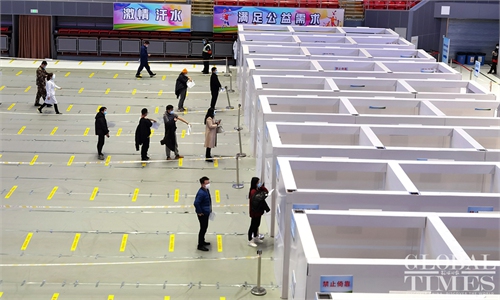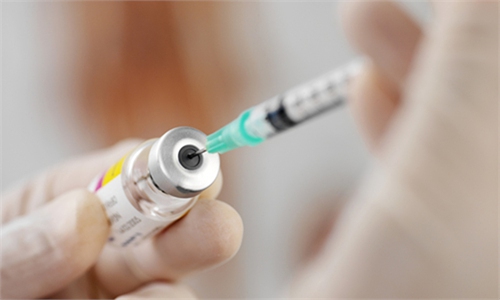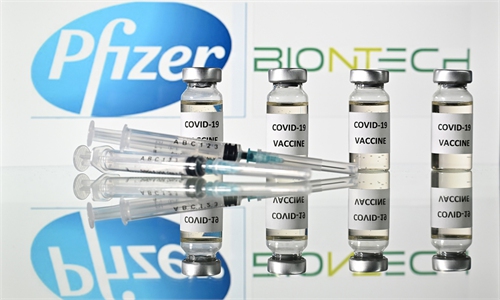China vaccinates up to thousands every day as winter spurs COVID-19 spread
Taking cautious approach to mass vaccinations, China determined to cover key groups in a speedy, organized manner
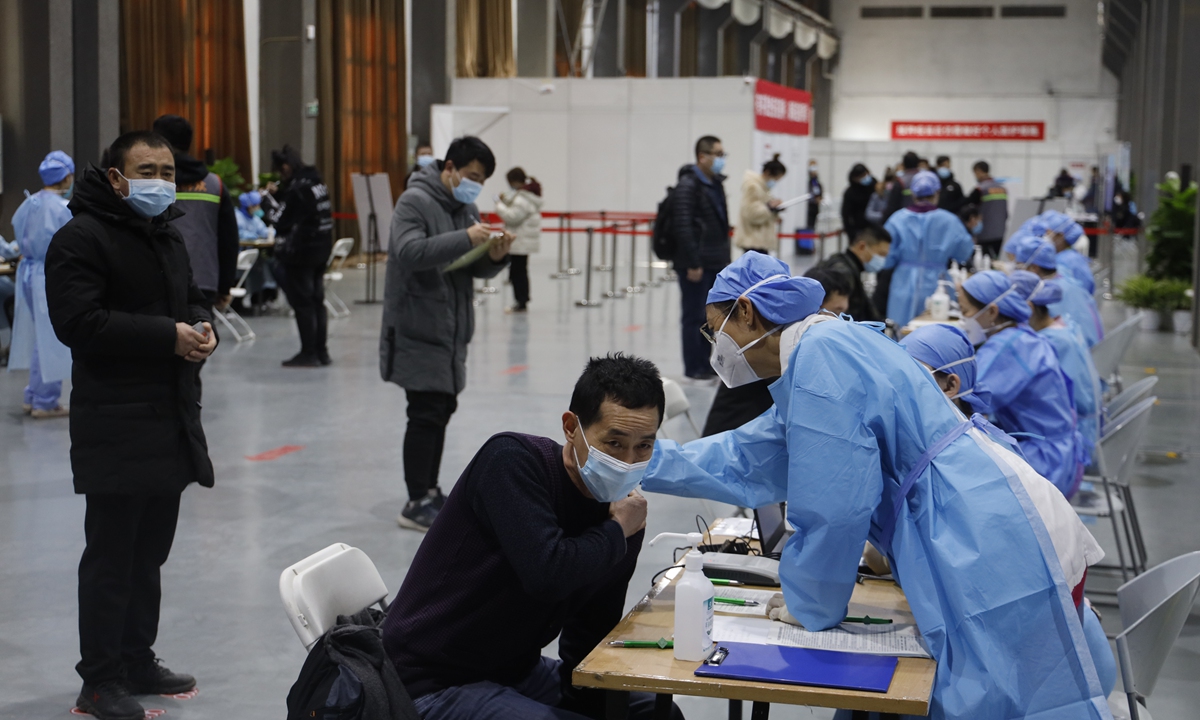
Medical workers check out people's health condition before vaccination at a temporary vaccination site in Chaoyang district, Beijing, on Monday. Photo: Li Hao/GT
More Chinese cities have begun mass COVID-19 vaccinations after the New Year holidays as China has approved its domestically produced vaccine for general use and expanded its scope of vaccination during the winter and spring seasons with the country soon embracing its largest holiday travel season by mid-February.
Given the goal of vaccinating 50 million people ahead of the 2021 Spring Festival holidays, cities including Beijing, Shanghai, Shenzhen in South China's Guangdong Province, Lüliang in North China's Shanxi Province, and Linyi in East China's Shandong Province have already started mass inoculations of vaccines, covering nine key groups of people. Beijing has vaccinated in total 73,537 people across 220 inoculation venues since the mass vaccinations began on Friday.
Related venues in other cities vaccinate on average 100 to 2,000 people each day, some local medics in Shandong and Shanxi told the Global Times on Monday.
When some Western media outlets continue to question the safety and efficacy of Chinese-made vaccines after China's top regulator officially approved it on Thursday for general use with conditions such as age restrictions and health status, more countries including Indonesia and Egypt embraced COVID-19 vaccines produced by Chinese manufacturers, underscoring their full confidence in Chinese vaccines, as China has been taking a different approach to vaccine development with a highly cautious attitude while continuing to accumulate experience.
Mass vaccinations underway
In Beijing's Chaoyang district, where more than 2,000 people were injected in a single day on Monday, the Global Times reporters saw groups of people lined up for their first doses of the recently approved COVID-19 vaccine developed by China National Pharmaceutical Group Corp (Sinopharm).
They mostly work in the cold-chain, food or logistics sectors, echoing the Chinese authorities' vaccination plan of covering nine key groups of people at the present.
The whole process takes around 50 minutes, including a 30-minute medical observation period after injection. Everyone was provided with detailed information about the inoculation and personal consultations regarding safety concerns, before they moved on to the injection area to get their first-in-their-life dose against the novel coronavirus.
Medical workers ask people to check the vaccine type and validity before administering the shots. Each vaccine can be traced back to its source via a code, and each individual's vaccination data is promptly recorded and then reported to the national Chinese Center for Disease Control and Prevention (CDC) system, medical workers told the Global Times.
The emergency room set up at the vaccination site is equipped with first aid facilities such as ventilators and defibrillators as well as professional rescue staff. An ambulance is parked outside the vaccination site to respond in case anyone has a serious adverse reaction.
At another inoculation site in Shijingshan district in western Beijing, Global Times reporters saw people who arrived to take the shot receiving a letter beforehand, showing some "dos and don'ts" including summaries of contraindications and cautions for the vaccine. For example, the current age limit for taking the shot is between 18 and 59 years old while other age groups still need to wait for results of further clinical trials. Pregnant and breast-feeding women and those with underlying diseases such as severe allergies, diabetes and hypertension are not suited for vaccination now, the letter read.
As of Sunday, 2,788 people in total have been vaccinated in Shijingshan district, and some of those at the site waiting for the shot told the Global Times on Monday that they have confidence in Chinese-made vaccines.
Monday was the fourth day since the Chinese government gave the green light for the first domestically produced vaccine for general public use. Given the recent sporadic outbreaks in several Chinese cities and the cold weather that spurred the virus to be more active, local CDCs and hospitals across the country have been undertaking vaccinations covering thousands of people every day, who also need immunity to the virus the most.
Compared to some chaotic and disorderly vaccine distribution scenarios in certain cities and states across the US, such as Florida, Chinese cities have been rolling out large-scale vaccinations in an orderly fashion, and local medics in different places have finished the relevant training in order to respond to emergency situations.
A local medical staffer at an inoculation site in Lüliang told the Global Times on Monday, "We have been fully prepared as local authorities recently began mass vaccinations for key groups of people, with computer systems upgraded and vaccine distribution ready."
In each county of Lüliang, there are one or two vaccination sites with each receiving about 100 people, she said. "We also monitor adverse effects after vaccination by reporting each receiver's body temperature for seven days, and we also call them occasionally to ask about their current state of health," noted the medical staffer who spoke on the condition of anonymity.
Tancheng county in Shandong has almost vaccinated 500 people so far since December 24 from the key groups stipulated by the country's top health authority as the first group of people to be vaccinated. "So far, we haven't received any reports of severe adverse effects," a local medic surnamed Du told the Global Times on Monday.
However, in some places outside China, the beginning of mass vaccinations were remembered as "chaotic." In the US, where medics have started receiving COVID-19 vaccines, some described the distribution unfair as the ones with the most exposure to the virus are not always the first to be vaccinated. Even the decision to approve COVID-19 inoculations for senior citizens in Florida spurred long lines at vaccination sites and a deluge of people crashing national computer systems and hospital mobile banking service to schedule their shots, according to media reports.
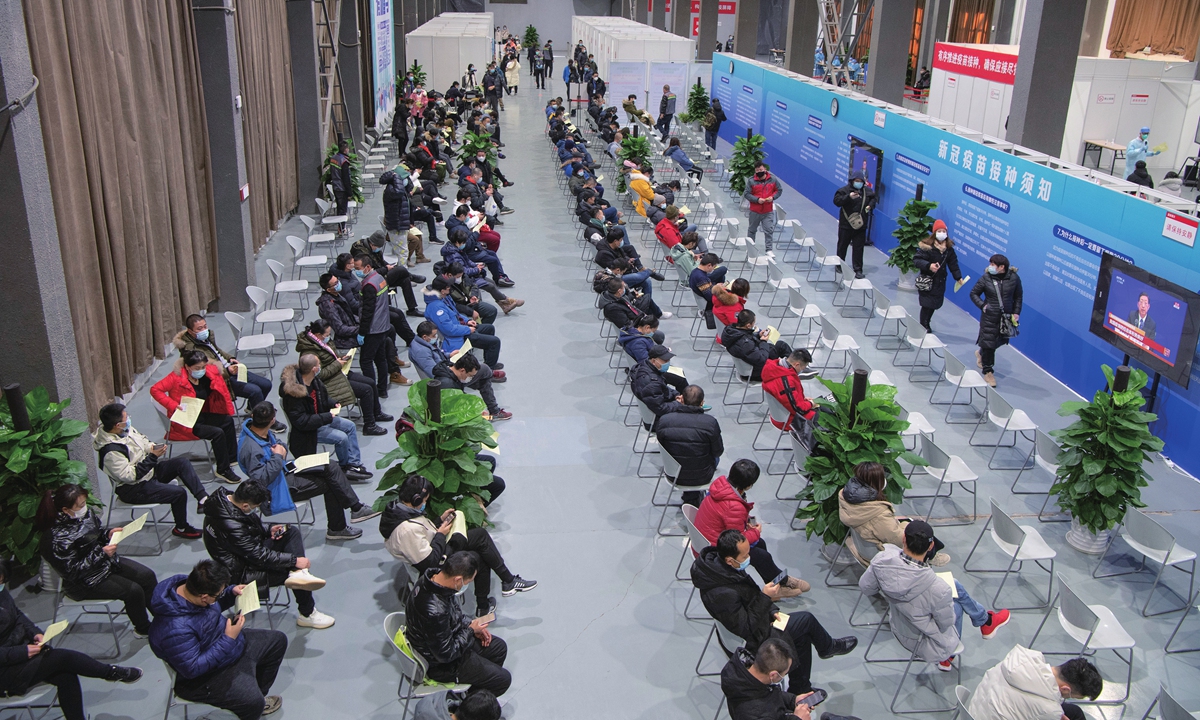
People wait for COVID-19 vaccine injections in Beijing on Sunday. Since the beginning of January 2021, the city has started vaccination in specific groups of people in industries such as catering services and cold-chain transportation. Photo: cnsphoto
Cautiously moving forward
China has officially initiated vaccinations for key groups of people since December 15, with over 3 million doses of coronavirus vaccines having been received, according to Zeng Yixin, deputy director of the National Health Commission. And with the approval of the Chinese-made vaccine and sped up supply capacity, mass vaccinations will then fully cover elderly people, groups with higher risks of underlying diseases before being carried out among the general public, Zeng told a press conference on Thursday.
When some foreign media highlight Chinese-made COVID-19 vaccines as not covering elderly people in the first round of mass vaccinations as a so-called argument for questioning their safety, with countries like Germany giving out vaccines to elderly people as a priority, a Beijing-based immunologist who preferred not to be named told the Global Times on Monday that China takes a highly cautious approach to rolling out the vaccines, which is also different from the West.
"We need to take 'coincidences' into account, given incidents have occurred with elderly people being vaccinated overseas," the expert said.
Also, in Sinopharm's clinical trials, the ratio of elderly volunteers and those with underlying diseases were believed to be relatively small, which would also explain the cautious use of vaccination among elderly people at present, according to industry observers.
Sinovac told the Global Times on Saturday that they have elderly participants aged over 60 years in their Phase-III clinical trials in Brazil, and may further disclose detailed data as the trials conclude in the future. Another leading producer Sinopharm had previously told the Global Times that they are conducting COVID-19 vaccine trials on minors to better understand the vaccine's safety and efficacy on a wider population, with data showing the vaccine is safe.
When asked about the safety and efficacy of domestically made vaccines, Chinese Foreign Ministry spokesperson Hua Chunying said at a routine press conference on Monday that the Chinese government has always made the safety and efficacy of COVID-19 vaccines a priority, and Chinese vaccine manufacturers have strictly adhered to scientific rules and regulations in pushing forward vaccine development in accordance with the law.
"I feel all right," said a teacher named Xiao Meng, who took the shot in Shenzhen's Luohu district a week ago, noting that she had mild symptoms like a headache after being vaccinated. "But we remain confident about our own vaccines, and many who have been vaccinated said they are proud to take the shot, especially as they are free of charge," Xiao said.
"From the experience of active vaccine use, the immune system's response to the vaccine in the elderly is often not ideal, usually needing to add adjuvant or increase the dose," Tao Lina, a Shanghai-based medical expert on vaccines, told the Global Times on Monday.
When compared to vaccines administered to young adults, a dose of an inactivated vaccine on the elderly may see a lower level of immunity, so more research is needed, Tao said, noting that there is no need to worry about the safety of the vaccines at all.
Cui Fandi also contributed to the story


